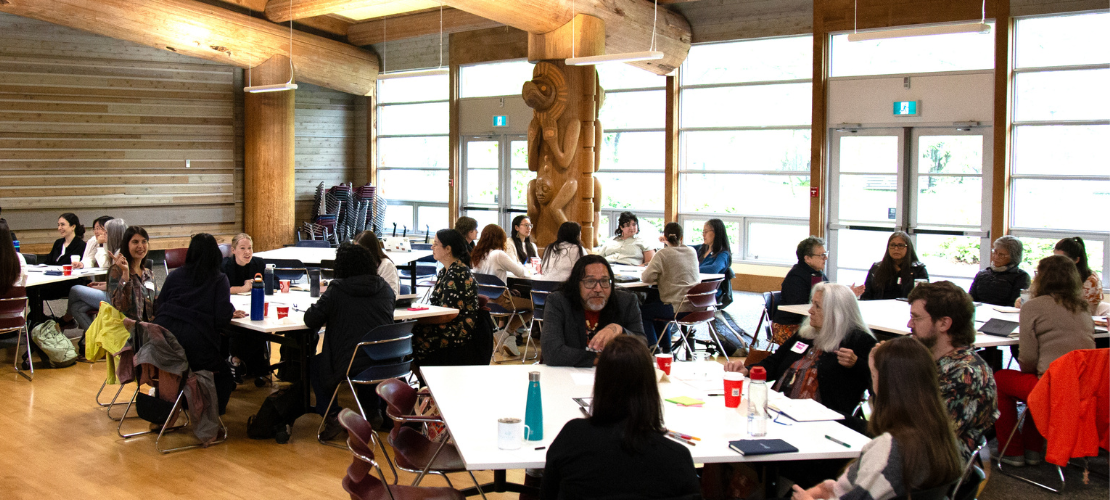May 28, 2024 began as any spring day might, with clouds covering the sky and raining down on the traditional, ancestral, and unceded lands of the hən̓q̓əmin̓əm̓-speaking xʷməθkʷəy̓əm (Musqueam) people. Nearly forty people were gathered in circle in the Sty-Wet-Tan Great Hall at the UBC Longhouse, listening closely to the welcome and opening prayer of Tsleil-Waututh Elder, Auntie Rosie George-Dapp.
Faculty, staff, and students from UBC, as well as Indigenous community members and other learners, were gathered for the first Roots Circle: a day of speakers, activities, and networking to learn, share, and build community around Indigenous-led research. A beaded eagle feather was passed counter-clockwise as guests introduced themselves to the circle. Sitting among them were Aboriginal Steering Committee (ASC) at Human Early Learning Partnership (HELP) Elder Duane Jackson and ASC Co-Chair Lori Huston.
The first to speak was Dr. Brittany Bingham, a proud member of the shíshálh (Sechelt) nation and the Director of Indigenous Research at the Centre for Gender and Sexual Health Equity. Dr. Bingham shared a story of Indigenous-led research and the space in-between – a community-based participatory action research study called AMPLIFY. She spoke of art as place of reflective storytelling, sharing the process of moccasin-making as an Indigenous research methodology. Oral histories have always been important to Indigenous peoples as our way of passing down our stories, teachings, protocols, and histories. This sacred practice can be invited into research by finding comfortable, safe, and empowering space that honours the knowledge carried within our stories, and locates that relational piece that makes research ceremony. Highlighting the importance of Indigenous methodologies, Dr. Bingham explained that when it comes to engaging in Indigenous-led research, it is crucial to remain strong in the knowledge that this way of research – research that is relational, responsible, enriching, and empowering – is rigorous research, and must be upheld by our institutions.

Dr. Bingham’s words continued to be discussed as the group prepared to share a meal together. Elder Duane offered a prayer, and the Elders, followed by the rest of the guests, were invited to eat. As lunch ended, Wendy Bond, a UBC Behavioural Research Ethics Board (BREB) project lead, was invited to share with the circle. Wendy is currently developing an Indigenous Research Ethics Repository, which aims to address the many ethics processes that just aren’t suited to research outside of what is colonially defined. Space must be made for Indigenous-led research in ethics, and this involves commitment from institutions to do the work of changing, altering, and dismantling the systems that are currently in place. Wendy spoke of the process of transforming the current ethics application procedure, a collaborative approach grounded in the needs of Indigenous researchers. The work is reflective, and often considers the project’s role within a broader cultural shift at the institution and the much-needed policy changes we have yet to see. The Repository is a reminder that despite being bound by the rules and regulations of larger organizations, transformative change is occurring, and policies are being challenged.

As the rain cleared and the afternoon settled in, the group welcomed Kinwa Bluesky to the circle to lead a reflective activity. Working from the Building Movement Project’s Social Change Ecosystem Map, Kinwa invited the group to consider the gifts and strengths they bring to their work. The room was abuzz as guests looked around to see a collection of Weavers, Visionaries, Caregivers, Disruptors, and the many other roles they embody. After some self-reflection, guests considered what support they need from their team, their community, their partners, or UBC. As a community, the Roots attendees envisioned and defined their overlapping needs, creating a web of care for each of the four categories, with the weavers of the group stepping in to build connections between ideas.

By the time the day came to a close, Grandfather Sun had appeared over Sty-Wet-Tan and the surrounding forest. Elder Duane closed our day, thoughtfully reflecting on the learnings. A big thank you to all those who joined us at the first Roots Circle. This day launched a new initiative hosted by HELP and the Centre for Excellence in Indigenous Health (CEIH), Roots: an Indigenous Partnered Research Circle. The Roots Circle has been thoughtfully shaped by a team at HELP and CEIH in partnership with the Indigenous Research Support Initiative (IRSI), with additional support from the First Nations House of Learning (FNHL), who generously provided our beautiful gathering space in-kind. Stay tuned for more opportunities to gather in circle with Roots.
Written by Sophie Carriere
Sophie Carriere is the research coordinator for a partnered project between HELP and the Centre for Excellence in Indigenous Health (CEIH). The project, entitled Creating Structures for Meaningful Indigenous Community & UBC Health Partnerships aims to explore and create structures that will support relational, reciprocal, and meaningful partnerships between Indigenous communities and UBC. If you have questions about this project, please contact Sophie.
Project Leads — Creating Structures for Meaningful Indigenous Community & UBC Health Partnerships
Martin Guhn, Associate Professor, UBC & Human Early Learning Partnership
Drew St. Laurent, Director of Operations, UBC Centre for Excellence in Indigenous Health
